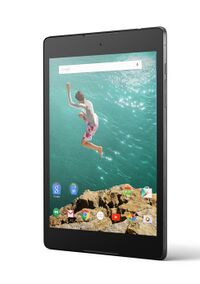Google Nexus 9 (htc-flounder): Difference between revisions
Appearance
m btns |
|||
| Line 43: | Line 43: | ||
== How to enter flash mode == | == How to enter flash mode == | ||
Hold {{Button|Power}} + {{Button|Volume Down}}, press | Hold {{Button|Power}} + {{Button|Volume Down}}, press {{Button|Power}} to confirm Fastboot mode | ||
== Installation == | == Installation == | ||
Revision as of 09:45, 29 September 2021
 Nexus 9 | |
| Manufacturer | HTC |
|---|---|
| Name | Nexus 9 (Wifi) |
| Codename | htc-flounder |
| Released | 2014 |
| Hardware | |
| Chipset | Nvidia Tegra K1 |
| CPU | 2.3 GHz dual-core 64-bit Denver |
| GPU | 192-core Kepler |
| Display | 2048×1536 LCD IPS |
| Storage | 16GB/32GB |
| Memory | 2 GB LPDDR3-1600 |
| Architecture | aarch64 |
| Software | |
| Original software | Android Lollipop 5.0 |
| postmarketOS | |
| Category | testing |
| Pre-built images | no |
| Mainline | partial |
| Flashing |
Works |
|---|---|
| USB Networking |
Works |
| Internal storage |
No data |
| SD card |
No data |
| Battery |
No data |
| Screen |
Partial |
| Touchscreen |
No data |
| Multimedia | |
| 3D Acceleration |
No data |
| Audio |
No data |
| Camera |
No data |
| Camera Flash |
No data |
| Connectivity | |
| WiFi |
No data |
| Bluetooth |
No data |
| GPS |
No data |
| NFC |
No data |
| Miscellaneous | |
| FDE |
No data |
| USB OTG |
No data |
| HDMI/DP |
No data |
| Sensors | |
| Accelerometer |
No data |
| Magnetometer |
No data |
| Ambient Light |
No data |
| Proximity |
No data |
| Hall Effect |
No data |
| Haptics |
No data |
| Barometer |
No data |
Contributors
- lillywho
Device owners
- Baasm (Notes: still stock)
- Dcambie (Notes: Actually lte version. Boots, USB problematic, DTS needs fixes :()
- Jja2000 (Notes: Looks like shit, but it'll do)
- MartijnBraam (Notes: On loan)
- No112 (Notes: own 2x, mainline work)
- Russanandres (Notes: LinageOS 15.1)
- Segfault (Notes: Currently porting mainline)
- UltrasonicMadness (Notes: Bubbling present in screen)
How to enter flash mode
Hold + , press to confirm Fastboot mode
Installation
$ pmbootstrap flasher flash_kernel
$ pmbootstrap flasher flash_rootfs
Minimal working dts
The following is a minimal working device tree that is just enough to boot into the initramfs debug-shell. The boot parameter clk_ignore_unused is a temporary workaround to fix an issue where the image on the screen slowly distorts to static as soon as the kernel boots. A similar issue is discussed here. Do not edit the google,flounder64 string, otherwise the bootloader will reject the dtb and refuse to boot the kernel.
// SPDX-License-Identifier: GPL-2.0
/dts-v1/;
#include "tegra132.dtsi"
/ {
model = "Google Nexus 9";
compatible = "google,flounder64", "nvidia,tegra132";
aliases {
serial0 = &uarta;
};
chosen {
stdout-path = "serial0:115200n8";
bootargs = "clk_ignore_unused PMOS_NO_OUTPUT_REDIRECT";
};
memory {
device_type = "memory";
reg = <0x0 0x80000000 0x0 0x80000000>;
};
clocks {
compatible = "simple-bus";
#address-cells = <1>;
#size-cells = <0>;
clk32k_in: clock@0 {
compatible = "fixed-clock";
reg=<0>;
#clock-cells = <0>;
clock-frequency = <32768>;
};
};
serial@70006000 {
status = "okay";
};
};
Mainlining notes
- The partition table is a special tegra thing where the sector the GPT is stored is passed as a kernel commandline argument by the bootloader.
- Broadcom BCM4354XKUBG wifi module
- Broadcom BCM4752 GPS
- Broadcom BCM2079x NFC (enable on PB1, irq on PR7, wake on PS1, i2c addr 0x77)
- NXP tfa9895 audio amp (enable on PX5, i2c addr 0x34)
- NXP tfa9895l amp (i2c addr 0x35)
- Realtek rt5677 codec (enable on PX3, i2c addr 0x2d)
- USB port is EHCI1, id pin is PW2
- On the LTE version the modem is on EHCI2
See also
- pmbootstrap!1309 Initial pull request
- pmbootstrap#1384 Kernel panic
- https://en.wikipedia.org/wiki/Nexus_9
- Device package
- Kernel package